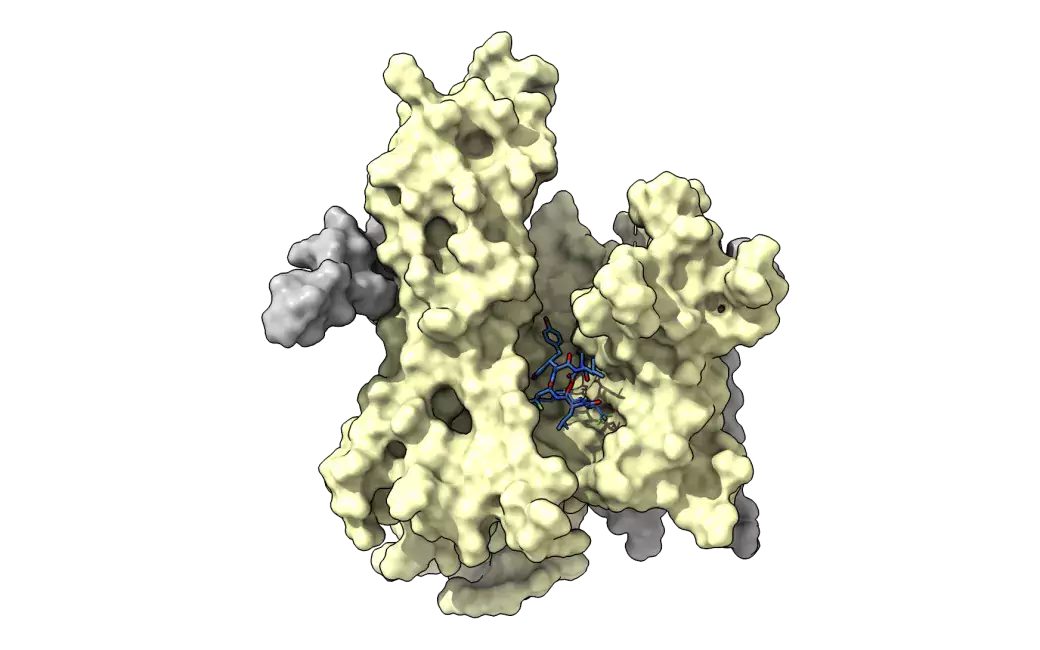A new molecular discovery helped ameliorate the symptoms of rheumatoid arthritis in mice. The use of small molecules makes drug development increasingly accurate. Their use is currently being investigated also in the treatment of cancer.

Researchers at the University of Helsinki, together with researchers from the United States, have discovered a small molecule that inhibits the formation in cells of cytokine proteins that promote inflammation. The mechanism is based on the fact that the small molecule blocks the secretion of cytokines entirely. By inhibiting a target protein known as Sec61, the researchers successfully alleviated symptoms of rheumatoid arthritis in a mouse model. The finding may also have relevance to the treatment of certain cancers.
"For the first time, we were able to describe on the level of atoms how a small molecule that blocks the cellular secretion of proteins relevant to the development of diseases, such as cytokines, binds to its target protein. This way, we were able to establish a model for blocking the production of various secreted target proteins with the help of small molecules," says Research Director Ville Paavilainen from the Institute of Biotechnology, University of Helsinki.
According to Paavilainen, the finding means that, in the future, such drug-like small molecules can be developed with increased accuracy to specifically prevent the formation of proteins associated with various diseases.
"The new atom-level knowledge we have produced on the target protein and the small molecule bound to it enables the rational design of novel molecules in drug development," Paavilainen says.
The researchers used chemical biology to determine how the small molecule that inhibits the function of the Sec61 protein functions in human cells and affects the functioning of the Sec61 protein channel. Using an animal model of rheumatoid arthritis, the researchers were able to demonstrate that the small molecule alleviated arthritis symptoms without adverse side effects.
The researchers also utilised Nobel Prize-winning cryo-electron microscopy to investigate how this small molecule binds to its large target protein. At the same time, the dynamics and interactions of this complex were investigated through atomistic computer simulations carried out on the supercomputers operated by the CSC - IT Centre for Science in Kajaani, central Finland.
Small molecules emergent in drug development
Many proteins formed in cells are associated with the onset of diseases. For example, proteins called cytokines, which function as mediators of inflammation, are known to underlie rheumatoid arthritis. Paavilainen's research group investigates the mechanisms by which various proteins that affect diseases are secreted in cells.
A range of small molecules have long been the subject of drug development. Most of the drugs currently available are aimed at influencing the secretion of proteins already generated, such as cytokines. In the research carried out by Paavilainen's group, the formation of proteins that contribute to the onset of diseases diseases is entirely blocked.
"Collecting more research knowledge on which proteins are associated with various diseases will enable the development of entirely new kinds of drugs. Of course, further research is needed. Our group will continue working on targeted small molecules," Paavilainen says.
The study was carried out in collaboration with Kezar Life Sciences, a United States pharmaceutical company. The company is currently investigating the effectiveness of blocking protein secretion in the treatment of certain solid and easily spreading malignant tumours.
The study was published in the journal Nature Chemical Biology in May.
Publication:
Rehan, S., Tranter, D., Sharp, P.P. et al. Signal peptide mimicry primes Sec61 for client-selective inhibition. Nat Chem Biol (2023). https://doi.org/10.1038/s41589-023-01326-1






